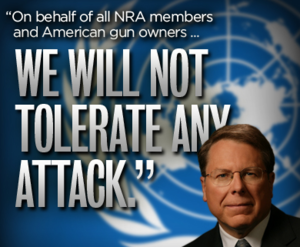GunsFighting gun restrictions on the international scene
The National Rifle Association (NRA) has taken its campaign against measures aiming to tighten gun control to the international level. The organization has been leading a campaign fight a UN treaty designed to restrict the flow of arms to conflict zones. The treaty is likely to pass, but the NRA appears to have enough support in the Senate to prevent ratification.

NRA president Wayne LaPierre addressing U.N. Arms Trade Agreement // Source: nraila.org
The National Rifle Association (NRA) has taken its campaign against measures aiming to tighten gun control to the international level. The organization has been leading a campaign to fight a UN treaty designed to restrict the flow of arms to conflict zones.
The UN’s Arms Trade Treaty which would require countries to determine whether weapons they sell would be used in the commission serious human rights violations, terrorism, or transnational organized crime.
The NRA says it is worried that the treaty would be used to regulate civilian weapons, but human rights organizations do not agree.
“This treaty is a common-sense alignment of the interests of governments, law-abiding citizens and individuals all over the world, who deserve the right to live free from harm,” said Michelle Ringuette, chief of campaigns and programs at Amnesty International USA. “Any step toward restraining the illicit sale and transfer of weapons used to commit horrific crimes is a good move forward, and the world could use a lot more steps in the direction of ending human rights abuses.”
The Washington Post reports that the Obama administration on Friday indicated it would be willing to support the treaty. “The United States is steadfast in its commitment to achieve a strong and effective Arms Trade Treaty that helps address the adverse effects of the international arms trade on global peace and stability,” Secretary of State John Kerry said in a statement. “We will not support any treaty that would be inconsistent with U.S. law and the rights of American citizens under our Constitution, including the Second Amendment.”
In 1996 the NRA has helped found the World Forum on Shooting Activities (WFSA), an international coalition of gun rights activists and gun manufacturers which is in to forefront of the campaign against the treaty.
“What we really object to is the inclusion of civilian firearms within the scope of the ATT,” said Tom Mason, the WFSA’s executive secretary. For the last two decades Mason, a lawyer, has represented the NRA in discussions with the UN on gun-related issues.
“This is a treaty that really needs to address the transfer of large numbers of military weapons that leads to human rights abuses. We have submitted language that you can define what a civilian firearm is,” Mason said.
In addition to worrying about the impact of the proposed treaty abroad, the NRA says the treaty could infringe on gun rights of American citizens, possibly even imposing on U.S. citizens a requirement to be part of an international registry.
NRA critics reject this claim. “The NRA claim that there is such a thing as ‘civilian weapons’ and that these can and need to be treated differently from military weapons under the Arms Trade Treaty is — to put it politely — the gun lobby’s creativity on full display,” Ringuette said in a statement.
“There is no such distinction. To try to create one would create a loophole that would render the treaty inoperative, as anyone could claim that he or she was in the business of trading ‘civilian weapons.’ ”
The Post notes that the American Bar Association’s Center for Human Rights said in a white paper last month that “it is unlikely the proposed treaty would compromise Second Amendment rights,” and if it did, “the treaty itself would be void.”
The treaty would cover battle tanks, artillery, combat aircraft, warships, and missiles as well as small arms and light weapons.
The UN almost adopted a draft treaty last July, but the United States suspended negotiations on the last day, and China and Russia, both big players in the global arms market, had their own reservations, also pulled out.
Treaty supporters note that the Obama administration’s last minute decision to suspend negotiations on the treaty occurred in the context of a presidential election campaign. What did not help was a letter which the NRA circulated, and which was signed by fifty-one Democratic and Republican senators, opposing the treaty. The letter put the president on notice that the senators would “oppose ratification of an Arms Trade Treaty presented to the Senate that in any way restricts the rights of law-abiding U.S. citizens to manufacture, assemble, possess, transfer or purchase firearms, ammunition and related items.”
The United States, Russia, and China have now returned to the negotiations over finalizing the treaty, and it is expected to be finalized next week.
The NRA reluctantly accepts that the treaty will likely pass. “I tend to think they will do something,” Mason said. “They are just desperate for a product. They want to bring something home.”
With backing of at least fifty-one senators, however, the NRA will probably settle for a fight in the senate over ratification of the treaty.
